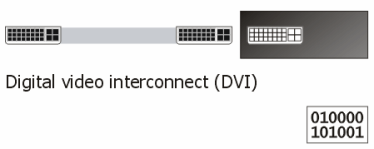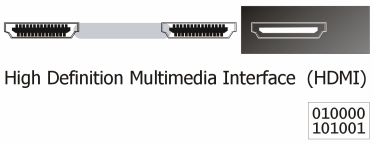Connecting it all up
 Brian Butterworth published on UK Free TV
Brian Butterworth published on UK Free TV Why are there so many sorts of connecting cables? Find out with this quick guide.
The connectors on each cable are called plugs (and are also called male) and they will usually fit only into one sort of socket (or female connector).
Most cables you will come across are male to male. Occasionally you will find leads with a socket on one end and a plug on the other, and these are called "extension cables".
SCART

The SCART cable is used to connect a set-top box to a television set, or to a video recorder. This can only be a short cable. The SCART cable carries all of these types of signal:
- analogue stereo sound
- a single RGB television picture
- a single composite video picture
- a single S-Video video picture
- widescreen picture signal
As stereo sound, RGB picture and widescreen signal is the best possible combination for digital television viewing, it is vital to use a SCART lead between any set-top box and the main television.
The composite video picture with stereo sound is the best combination for a VHS video recorder. If your set-top box has two SCART sockets, it is likely that the one marked TV will carry RGB picture information and the other will not.
If your television has more than one SCART input, you may need to choose a special one (marked RGB) if you want to use RGB from the SCART cable.
On most set-top boxes it is possible to turn the RGB output on and off. This can be used to test the RGB input function on the television ? the picture quality appears blurred when it is disabled.
If have a DVD player, rather than a VHS recorder, you can attach this to the set-top boxes second SCART connector. The signal from the set-top box will normally be overridden by the DVD player when it is on, usually in high-quality RGB.
Some very cheap SCART cables do not have all the pins connected. They may not provide RGB and widescreen picture signals. SCART cables are normally no more than three metres in length.
UHF lead

The UHF lead is a lead that you would traditionally associate with television signals. They can carry:
- up to 45 (but normally only five) analogue television channels
- a single picture from a set-top box
- around 50 analogue cable TV channels
- mono sound
- NICAM stereo sound
- Teletext services (for example, Ceefax)
You can't avoid these cables if you are going to use Freeview, as these cables are the only ones that you can use to distribute Freeview signals around the house.
Where you have an integrated digital television (an idTV) you just need to get the signal from the aerial to the television with one of these cables.
If you are using a Freeview set-top box, you will need to get the signal from the aerial to the set-top box using this aerial lead, but for best results connect the TV to the box with a SCART cable.
You can also use a UHF lead to connect a set-top box to a television somewhere in the house. Your set-top box will require a RF (radio frequency) modulator. Note that "RF passthough" is another way of saying there is no modulator. You will be able to "tune" the second television into the picture showing on the set-top box.
Some boxes (all Sky boxes) have the ability to connect a remote control receiver to the second TV end of the interconnecting cable, so you can change channels.
The set-top boxes, whilst providing a reasonable quality picture to the second TV, will always provide only mono sound via a UHF lead.
The step-change in picture quality obtained by switching to RGB on a SCART is far greater than any obtained though spending any more on a gold-plated SCART cable.
Satellite or cable TV cable

These cables are usually very stiff, and have a very basic screw connector on the end. Usually they will provide an unbroken link to the satellite dish. At the dish end they plug into the device on the end of the arm, the LNB.
Don't try to disconnect these cables when the set-top box is on. Usually there is a small voltage that will cause dangerous sparks.
If the cable connects to a satellite dish, there is not much you can do with the cable. Each receiver in the set-top box needs it's own wire to the LNB. With a personal video recorder (such as Sky+), or a multi-room installations there are two cables to the four-output LNB on the dish. If you want more rooms, each will require it's own cable.
If the cable is providing cable TV, then it is possible to use inexpensive "Y connectors" to link the incoming signal to various set-top boxes, cable modems, or - via an adaptor - directly to the back of a TV.
Composite video cable

This is the most simple and basic video connection you can get. It carries:
- a single picture from a set-top box
The picture will be in colour, and of comparable quality to a analogue broadcast station. However, there is no sound. For that reason this cable is often found joined to a stereo audio cable.
These signals are quite robust and can be carried for many metres. Often modern television sets have a single yellow photo input on their front input panel.
You also use an identical cable to carry digital stereo (SPDIF) sound.
Stereo audio cable

These cables carry the left and right channels of sound on two joined cables. They are usually required when a SCART cable is not being used, as the SCART cable already carries stereo sound.
If you are connecting your set-top box to an external stereo system, a separate stereo audio is used.
There is no real practicable limit to the length of these cables, but excessive length will degrade the quality of the signal.
S-video cable

The S-video standard is not well supported by most UK digital TV boxes, and very few have a S-video socket. If you need one for a particular analogue camcorder, use it, but avoid S-video with digital television. If you are using what appears to be a monochrome picture from a SCART lead, it will certainly by an incomplete S-Video signal and you should change to the RGB input.
VGA cable

This is the cable you will use to connect a computer to a old style monitor, and some modern LCD screen too. Most modern LCD TVs will have a VGA input too.
If you want to connect a set-top box to a LCD monitor, you can buy a conversion box from around 60. However this will not result in a better picture than using an existing SCART socket if there is one.
The only way to get higher than normal television resolution is to use a VGA in conjunction with a personal computer or modern games console.
DVI cable

If you want to get the very best out of a television or monitor use a digital video interconnect (DVI) cable.
This will be the only way for most televisions and monitors to receive high-definition pictures from a computer, and some set-top boxes.
If you can use either a VGA cable or a DVI cable, choose the DVI option.
HDMI cable

If you want to get the very best out of a television use a HDMI cable.
This will be the only way for most televisions to receive high-definition pictures from set-top boxes.
Help with Television sets?
Sunday, 8 January 2012
J
jb3811:23 PM
kath: And if I could just second what Dave Lindsay has said! although what you mention about it not working as you envisaged, could I feel have partly been the cause of the problem you were having, but I can assure you that it "is" working exactly as it should be, this is two different systems selected purely by pressing the source input button.
| link to this comment |
Saturday, 14 January 2012
B
Bob2:52 PM
How can I connect a blu ray disc player to my TV when I already have a sky+ box connected to the HDMI port ?
| link to this comment |
Sunday, 15 January 2012
Bob: Yes, use an HDMI switch, you can get them for less than £20. Tesco 3Way HDMI Switcher - Tesco.Direct for example.
| link to this comment |
T
tessa5:23 PM
How do I connect a dvd, freesat box and tv when all only have one scart socket? The freesat works fine connected to TV but I would like to also use a dvd
| link to this comment |
How do i successfully connect a freeview hard drive to a freeview tv? Am i missing a hdmi cable? I have the scart connecting them and the output audio cable but cant use the remote for the freeview hard drive as it's not picking up the connection?
| link to this comment |
J
jb386:43 PM
tessa: If the Freesat box has two scart sockets then connect the DVD into the other one, then when you want to use the DVD just put the Freesat box in standby.
That said though, depending entirely on the internal connections on the Freesat box, you might find that the DVD might switch through the box as soon as you either switch it on or press play.
If neither way works, then you will have to purchase a two way scart switch box, its common scart outlet being connected into the TV, then the Freesat box to its No1 input and with the DVD to input 2.
| link to this comment |
J
jb386:59 PM
Lynne: When you say a Freeview hard drive are you referring to a Freeview DVD recorder with a hard drive, or is it a Freeview PVR? and the other point I am not sure about is why you refer to an audio cable, for what purpose?
The other thing is whether or not your TV has an HDMI socket, and if it has does that also apply to the hard drive you refer to?
But basically, if you have the two devices coupled together via a scart lead and your hard drive is connected into the TV's AV1 input, then the TV should switch over to it as soon as its (the hard drive) switched on, if it doesn't then press the A/V button on your TV's remote control. Would have been of assistance though to know the TV's model number.
| link to this comment |
Wednesday, 25 January 2012
J
j9:59 PM
is it possible to conect a toshiba hard drive dvd video player with only a scart socket to a new lg tv as l am not getting the tv through it,l can watch stuff l have already recorded but when recording it records a blank screen on this tv is it because its a different connection now and you cant do it with a scart,l had a seperate freeview box before,now it is in the tv ready can anyone help thanks
| link to this comment |
J
jb3811:15 PM
j: You cannot record from a scart socket on every brand of TV as it depends on the design of the set, if you had stated the model of TV involved this could have been checked on, however if you have the manual for it go into the specifications section / connections and look at the scart sockets description, and if you do not see "in / out" mentioned under the video heading then that's your problem.
If you dont have the maual then if you provide the model number this can be checked.
| link to this comment |
Select more comments
Your comment please!